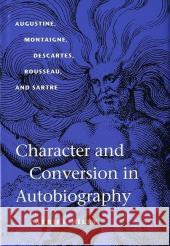Character and Conversion in Autobiography: Augustine, Montaigne, Descartes, Rousseau, and Sartre » książka
Character and Conversion in Autobiography: Augustine, Montaigne, Descartes, Rousseau, and Sartre
ISBN-13: 9780813922928 / Angielski / Twarda / 2004 / 256 str.
What happens, asks Patrick Riley, when a life transformed becomes an autobiography? What is the relationship between the subjective upheaval of conversion and the representation of character? Who, then, is this -self- writing the narrative of a life? Thinking of conversion as a radical turning point or fulcrum on which incompatible configurations of character are precariously balanced, Riley examines both historically and tropologically the paradoxes of identity and life writing that conversion raises. While conversion can motivate the writing of an autobiography that ties together threads of a life story, it also implies a fragmentation of character. As it creates a unified framework for the subject's history, it also disrupts any stable conception of the self.Beginning with Augustine's Confessions as the canonical model of religious conversion, the author investigates the changing forms of conversion in selected works by Montaigne and Descartes, culminating in reformulations by Rousseau and Sartre. Moving from a purely religious rebirth to works grounded in a personal philosophy or aesthetic vocation, the autobiographies considered in this book stand as episodes in a genealogy of conversion.Riley argues that the metamorphoses of character inherent to conversion disrupt any interpretation or even representation of the self as static. It is no longer clear that the narrator represents the subject in any but a nominal way. In fact, Riley contends, the subject of an autobiography can never be self-identical.Challenging predominant theories of subjectivity in autobiography, Character and Conversion in Autobiography recognizes subjectivity as a dynamic process and suggests a redefinition of how we examine character and life writing.











